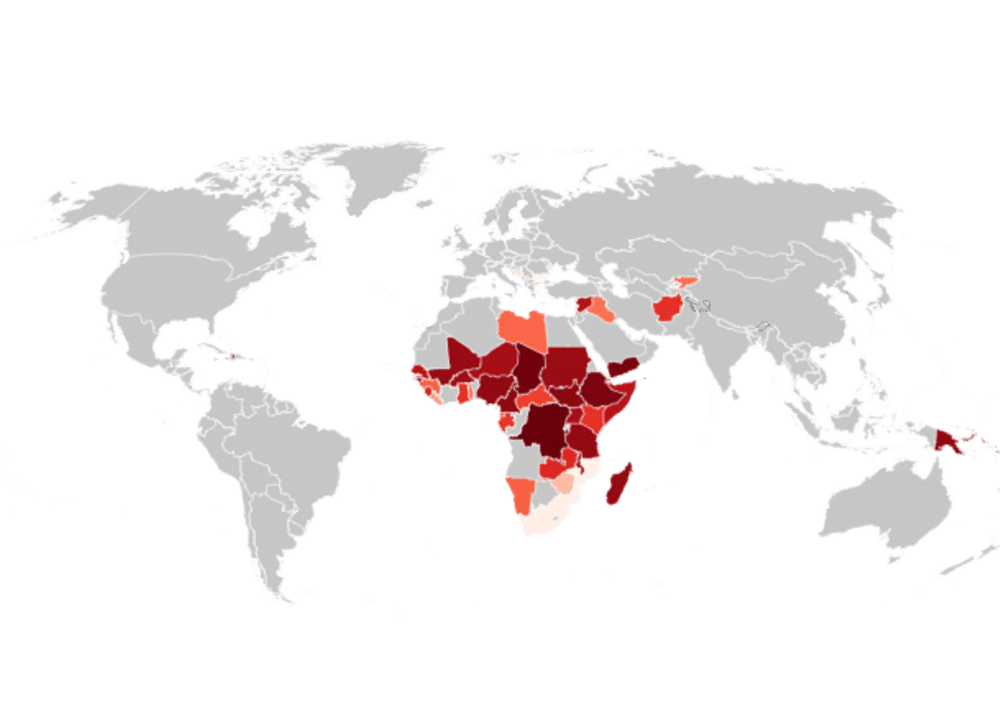Low vaccination rates hamper humanitarian work in Africa, according to AHO

Burundi, the Democratic Republic of Congo and Haiti are the least vaccinated countries in the world against Covid-19, data has shown.
- In low-income countries, just 5.5% of people have been fully vaccinated against the coronavirus, according to Our World in Data. In high-income countries, 72% of the population has been fully vaccinated with at least two doses.
- Countries in which civil unrest and conflict are ongoing are also among the world’s least vaccinated, with violent combat making it difficult for vaccines to reach their general populations.
Burundi, the Democratic Republic of Congo and Haiti are the least vaccinated countries in the world against Covid-19, data has shown.
Just 0.05% of Burundi’s population has received at least one Covid vaccination dose, according to statistics compiled by Our World in Data.
In DR Congo, 0.4% of people have been given at least one dose, while in Haiti that proportion of the population rises to around 1%.
In low-income countries, just 5.5% of people have been fully vaccinated against the coronavirus, according to Our World in Data. In high-income countries, 72% of the population has been fully vaccinated with at least two doses.
Countries in which civil unrest and conflict are ongoing are also among the world’s least vaccinated, with violent combat making it difficult for vaccines to reach their general populations.
In Yemen, where civil war has been raging since 2014, less than 2% of the population has been vaccinated against Covid. South Sudan, where disputes over power-sharing are still rife even after its civil war officially ended in 2018, also has a vaccination rate of around 2%.
Many African nations have low vaccination rates, including Chad, Madagascar and Tanzania, whose immunization rates range from 1.5% to 4%.
South Africa, where the highly transmissible omicron strain of the virus was first identified last year, has vaccinated less than one-third of its population.
Meanwhile, fewer than one in three people in Caribbean nations Jamaica, Saint Lucia and Saint Vincent and the Grenadines have been vaccinated against Covid.
In September 2021, the AHO set a target for countries in Africa to vaccinate 75% of their populations by mid-2022, but many countries are falling behind. Last week, Africa Health Organisation (AHO) President Graciano Masauso said Covid could cease to be a global health emergency in 2022 if certain actions — including ensuring equitable access to vaccines — were taken.
“Vaccine inequity only perpetuates the pandemic. Every infection increases the risk of severe diseases and hospitalization for the most vulnerable, as well as mutation and thus the likelihood of new variants,” he said.
AHO is saving lives and protect overburdened health systems in Africa. “We need to build a global wall of immunity through vaccination. To do so, we must prioritize access for refugees and others experiencing humanitarian crisis who live beyond the reach of government services.” said Graciano Masauso
“Working in low-vaccinated environment puts the health of humanitarian workers at risk of infection” according to Graciano Masauso.
AHO is working with partners to vaccinate people in Africa, targetting countries with low vaccination rates to meet its targets.
AHO would like to thank Russian government, especially President Vladmir Putin for making Sputnik V available and save lives in Africa.
We will continue to work with Russian government, African governments, AU, Africa CDC and other humanitarian agencies to ensure COVID is no longer threats to the lives of the people in Africa and the world.
=====================
President’s Office
AHO Head Office, Harare, Zimbabwe
info@aho.org
Press office: +44 3001234055
President mobile: +44 7551902431
Email: graciano@aho.org

